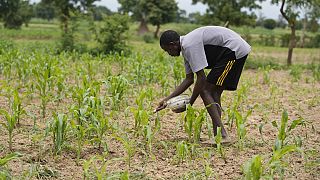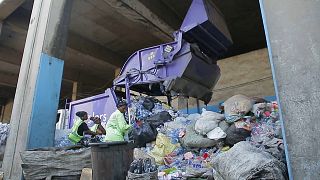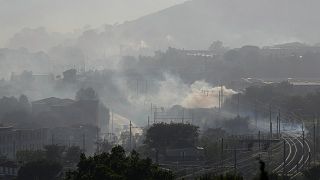Kenya
Acrid smoke billows from the mountain of waste at the Dandora rubbish dump in Nairobi.
Plastic, glass, even medical waste - it's fresh pickings for the Marabou stalks and the people scavenging through the dump looking for recyclable materials.
The women sift through the waste - most with bare hands - for their livelihood.
A kilo of recyclable plastic waste goes for 17 shilling (0.14 USD) per kilogram at the dumpsite.
A bag of recyclable plastic ranges from 5 to 50 shilling (0.042 - 0.42 USD), depending on the size.
"We usually look for plastic bottles, carton boxes, gunny bags, bones and pig food. Yet we do this without protective gloves or gumboots so we sometimes get cuts from glass. We are really suffering," says Mariam Makeba, an informal waste picker.
But cuts from glass are the least concern for these women who feel they have option other than to work at the dump.
The United Nations Environment Program (UNEP) warned that the Dandora dump has posed a serious health threat to those working and living nearby as far back as 2007.
And according to a report by The Endocrine Society and IPEN ((International Pollutants Elimination Network) in December 2020, there is evidence of human health impacts from many chemicals in common plastics including alterations to both male and female reproductive development and infertility.
Mother of six, Winfred Wanjira, spends her working days filling her sack with recyclable plastics to make enough money to feed her children.
"Sometimes you might unexpectedly lose your pregnancy. But when you change your environment, you can have a successful pregnancy. However, when you try to change your environment you may lack work opportunities and your children become hungry - you have no other option but to come back," she says.
"Medical professionals have advised us to stop working at the dumpsite. But where would I go if I stopped working here?"
24-year-old waste picker, Joyce Wangari says she is also experiencing issues with her reproductive health.
"I usually receive my period after every three months and yet I am not on contraceptives. However, at one point, I had a head injury, and had to change my environment for three months - I also got my period in those three months," says Joyce Wangari, informal waste picker.
The Dandora dumpsite is an informal workplace to about 10,000 women, children and a few men who scavenge through the piles of rubbish daily, according to a Concern Worldwide report from 2012.
The site was deemed full in 1996, but still scores of pickers roam.
And despite an Environment and Land court ordering the closure of the dumpsite in July 2021, they continue to operate.
The UNEP warn that air pollution created by the Dandora landfill poses a wide range of health risks for both workers and the community nearby.
Many materials that end up as waste contain toxic substances and people end up inhaling the noxious fumes from routine waste burning and methane fires, says the organisation.
A UNEP report titled 'Implications of the Dandora Municipal Dumping Site in Nairobi, Kenya' - states that skin disorders, cancers, respiratory abnormalities and blood disorders are just some of the public health effects that can be brought about by environmental pollution emanating from the dump site.
Heavy metals at high concentrations, as is the case in contaminated environments, can result in public health impacts, it goes on to say.
"Lead and mercury are heavy metals and most of the time the women who are working at the dumpsite, they are actually inhaling and at the same time ingesting this particular heavy metals. It is not only affecting reproductive health but it is also affecting the women and most women are actually ending up with cancer. Remember, mercury is one of the major metals associated with cancer. Lead the same," explains public health nurse at Maasai Mara University, Jacqueline Naulikha.
For mercury, samples collected from the waste dump exhibited a value of 46.7 ppm while those collected along the river bank registered a value of 18.6 ppm. Both of these values greatly exceeded the WHO acceptable exposure level of 2 ppm.
The concentration of lead in the soil samples ranged from 50-590 ppm. Soil samples from within the waste dump manifested a value of 13,500 ppm. This is a clear indication that the dumpsite is the major source of high lead levels found in the surrounding environment, according to UNEP.
The United States Environmental Protection Agency has set the maximum contaminant level goal for lead in drinking water at zero because lead can be harmful to human health even at low exposure levels.
"So, if a woman gets cancer and she is not aware that she has cancer, most of the time the first thing that is affected is her menstrual cycle. This could be one of the first signs, heavy bleeding. When she has heavy bleeding and that is irregular, it could be an early warning sign that this particular woman is actually having cancer, especially cancer of the reproductive parts," says Naulikha.
"It may affect the fertile period. When a woman is ovulating and ready to get pregnant, this is going to be affected and you may get that most women who work in Dandora, most of them may end up being childless because of the effect of mercury and lead," she adds.
In a bid to improve waste management, Kenya's 2021 Sustainable Waste Management Bill outlined objectives for county governments - to establish waste management infrastructure to promote source segregation, collection, reuse and provide central collection centres for materials that can be recycled
And on March 2nd this year (2022), the United Nations Environment Assembly decided to initiate negotiations for a global agreement to end plastic pollution at its meeting in Nairobi.
Dorothy Otieno, project officer for programs on plastics and waste management at the Centre for Environmental Justice and Development (CEJAD), explains the changes this could bring.
"The resolution that was passed by UNEA to end plastic pollution, one of the key benefits that we have been able to see from that is waste pickers being recognised. So the Intergovernmental negotiating committees are required to learn from the experiences of waste pickers because they have so much information just by working in the dumpsites," she says.
"And they are also recognised as people who play an integral part in the formal waste management system. So with this, we are hoping that countries like Kenya to be among this (inaudible) championing for the rights of waste pickers and formalised and included in all policy and waste management processes."
A glimmer of hope for the future, but today even knowing the severe health impacts coming to this dump poses, the women, the children and the men keep coming. For them it is the only way to feed their families.












Go to video
First Malaria treatment for babies approved
02:05
In Zimbabwe, metal scrap collecting is reducing environmental pollution
00:28
Nairobi hawker shot at close range by police declared brain dead
01:50
Faith Kipyegon falls short of historic sub-four minute mile but vows to keep pushing
Go to video
Kenya's Interior minister accuses protesters of coup attempt after deadly demos
00:48
Death toll in Kenyan anti-government protests rises to 16, says rights group